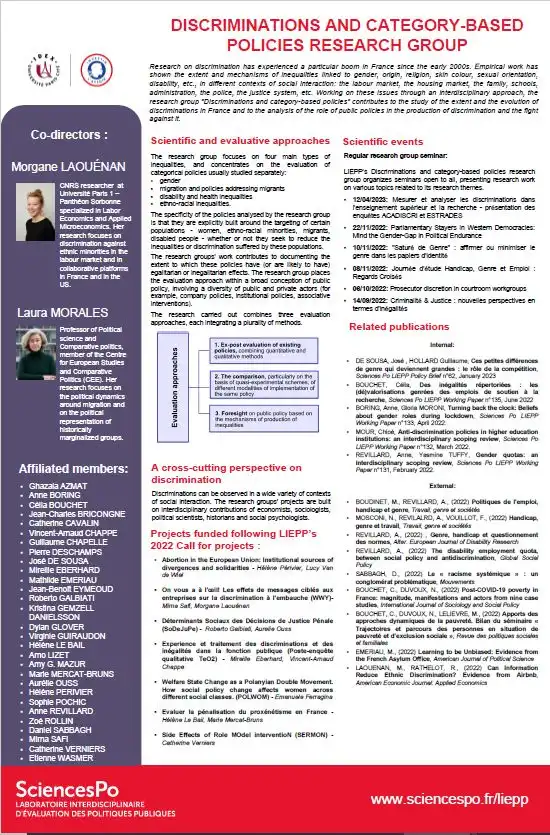
Home>Research>Research Groups>Discriminations and Category-Based Policies
Research Group: Discriminations and Category-Based Policies
Research group directors: Morgane LAOUENAN, Laura MORALES
Involved members: Anne BORING, Célia BOUCHET, Magda BOUTROS, Catherine CAVALIN, Guillaume CHAPELLE, Aline DAILLERE, José DE SOUSA, Roberto GALBIATI, Dylan GLOVER, Joëlle KIVITS, Pauline MADIES, Amy MAZUR, Sophie NOYE, Aurélie OUSS, Anne REVILLARD, Mirna SAFI, Catherine SPIESER, Catherine VERNIERS, Louise VIROLE
Presentation of the Discriminations and Category-Based Policies Research Group

Research on discrimination has experienced a particular boom in France since the early 2000s. Empirical work attests to the extent and mechanisms of production of inequalities linked to gender, origin, religion, skin colour, sexual orientation, disability, etc., in different contexts of social interaction: labour market, housing market, family, school, administration, police, justice, etc.
Public policy is not neutral in the face of this phenomenon. In addition to the effects induced by public policies in the areas listed above, category-based policies explicitly targeting certain populations (women, ethnoracial minorities, migrants, persons with disabilities, etc.) help to alleviate or, on the contrary, accentuate the discriminations suffered by these populations.
LIEPP's "Discrimination and category-based policies" section is devoted to these issues and contributes to the public debate through an interdisciplinary research approach by assessing the extent and evolution of discrimination in France and analysing the challenges it poses to public policy. It combines research on the measurement of discrimination, on the experience of discrimination, and on (anti-)discriminatory policies.
This strand brings together bodies of work on types of inequality and category-based policies that are usually studied separately:
- Gender
- Migration and policies towards migrants
- Disability and health inequalities
- Ethno-racial inequalities.
The specific feature of the policies analysed in this section is that they are explicitly built around the targeting of certain populations - women, ethno-racial minorities, migrants, and people with disabilities - whether or not they seek to reduce the inequalities or discrimination suffered by these populations. Research carried out within this axis contributes to documenting the extent to which these policies have (or are likely to have) egalitarian or unequal effects.
These policies are implemented by a diversity of actors beyond governmental actors alone, and are studied as such in the various ongoing projects of the axis: for example, policies defined by private firms or implemented by NGOs. The axis therefore situates its approach to evaluation within a broad conception of public policy, involving a diversity of public and private actors.
We combine three evaluative approaches, each integrating a plurality of methods.
- Ex-post evaluation of existing policies, combining quantitative and qualitative methods;
- Comparison of different ways of implementing the same policy, particularly on the basis of quasi-experimental systems;
- Foresight on public policy based on the analysis of the mechanisms that produce inequalities - the aim is to establish a link between studies documenting the mechanisms that produce inequalities and possible courses of action for the public authorities.
This axis supports the International Expert Group on Migration (GIEM) initiated by Virginie Guiraudon, Hélène Thiollet and Camille Schmoll, which brings together international scientists in the field through networking existing research institutions in different countries.
Finally, the axis hosts the research component of the Chair for Women's Entrepreneurship, which aims to create and scientifically evaluate interventions aimed at reducing the barriers women face in their careers.
Contact: discriminations.liepp@sciencespo.fr
Seminars of the research group
The discriminations and category-based policies research group organizes seminars open to all, presenting research work on various topics related to its research themes.
Find out more about the Discriminations and Category-Based Policies Seminars.
Associated research projects
Ongoing projects
- Wage inequality in the spotlight: an analysis of pay gaps between women and men in the entertainment industry (2025)
- Preventing gender and sexual inequality and discrimination through the development of non-sexist education in social work: from recommendations to implementation (2025)
- Mapping and characterising prevention measures to combat gender-based and sexual violence in higher education and research (INTER-VSS) (2025)
- From police over-targeting to non-use of justice: Investigation in three areas of the Paris region (2025)
- (In)justice reproductive en France: Les droits reproductifs au prisme des rapports de domination de genre, de race et de classe (JR France) (2024)
- Gender Homophily in Team Formation (GHTF) (2024)
- Riots and public policy: a comparative socio-territorial analysis of the 2023 riots (2024)
- Promoting the economic autonomy of disabled people through employment and social policy (PRESPOL) (2023)
- Abortion in the European Union: Institutional sources of divergences and solidarities (2023)
- The effects of targeted messages to businesses about discrimination in hiring (WWY) (2023)
- Déterminants Sociaux des Décisions de Justice Pénale (SoDeJuPe) (2023)
- Experience et traitement des discriminations et des inégalités dans la fonction publique (Post-enquête qualitative TeO2) (2023)
- Welfare State Change as a Polanyian Double Movement. How social policy change affects women across different social classes. (POLWOM) (2023)
- Assessing the criminalization of procuring in France (2023)
- Side Effects of Role MOdel interventioN (SERMON) (2022)
- Stereotypes, self-image concerns, and job search behavior (2022)
- Impact des travaux des économistes sur leurs parcours et leurs travaux (2022)
- Equal Pay Policy in Practice: An International Research Workshop (EQUAL PAY GEPP) (2022)
- Un état des lieux des recherches sur les discriminations: les faits, les explications et les implications pour les politiques publiques (2021)
- Bienvenue en France : Les contrats d'intégration peuvent-ils favoriser l'intégration des immigrés ? (2021)
- Inclusive Democracies? Conceptualising and Measuring the Descriptive and Substantive Political Representation of Under-represented Groups in Democratic Parliaments (InclusiveParl) (2021)
- Les politiques de lutte contre les discriminations dans l'enseignement supérieur : une revue de littérature interdisciplinaire (2021)
- Access to Abortion and Telemedicine Abortion in France: A mixed-method study on why individuals resort to telemedical abortion over local abortion services in France (2020)
- Handicap, genre et précarité professionnelle : parcours biographiques et réception de l'action publique (2020)
- Discriminations fondées notamment sur l'origine dans l'accès aux biens et services sur plusieurs plateformes collaboratives (2020)
- Les effets des quotas de genre (2019)
- Chaire pour l’entrepreneuriat des femmes - volet recherche (2018)
- The role of workplaces in hiring discrimination in France: evidence from a large-scale correspondence study (2017)
- Colloque international -Des politiques sociales égalitaires ? Des principes à la réalité de l'exercice professionnel (2020)
- Evaluation d'impact sur la diversité des recrutements des formations "Recruter sans discriminer" (2018)
- Différences de genre dans les aspirations professionnelles des étudiantes et des étudiants (2017)
- Groupe international d'experts sur les migrations (GIEM) (2018)
- Disability and Work (2017)
- Sources de discrimination et économie collaborative (2015)
- Discrimination positive à la française (2014)
- Discrimination raciale et mobilité internationale du travail (2014)
- La réception des politiques du handicap : une approche qualitative (2014)
Publications of the research group
- GEOFFROY, Mathilde, LE BAIL Hélène, MERCAT-BUNS, Marie, L'incrimination large du proxénétisme en France pose-t-elle problème ? Comment les professionnel•les du droit composent avec les paradoxes des infractions de proxénétisme pour les mettre en œuvre, Sciences Po LIEPP Working Paper n°174, Janvier 2025
- Anne REVILLARD, Les inégalités de genre dans l’enseignement supérieur et la recherche: Discussion autour du LIEPP Policy Brief nº14 LIEPP Working Paper [Methodological Discussion Paper] n°34bis, octobre 2014
- Pierre DESCHAMPS, José DE SOUSA, Labor Mobility and Racial Discrimination LIEPP Working Paper , n°35, December 2014
- Amy G. MAZUR, Does Feminist Policy Matter in Post Industrial Democracies? A Proposed Analytical Roadmap , LIEPP Working Paper n°42, november 2015
- François BONNET, Etienne LALÉ, Mirna SAFI, Etienne WASMER, Better residential than ethnic discrimination! Reconciling audit's findings and interviews'findings in the Parisian housing market LIEPP Working Paper n° 36, février 2015
- François BONNET, Robert ELLICKSON, Etienne LALÉ, David LAITIN, Mirna SAFI, Etienne WASMER, Better residential than ethnic discrimination! LIEPP Working Paper [Methodological Discussion Paper] n°38bis, September 2015
- Anne REVILLARD, La réception de l'action publique LIEPP Working Paper, n°55, July 2016
- Clément BELLET, Eve SIHRA, Less Food for More Status: Caste Inequality and Conspicuous Consumption in India LIEPP Working Paper, n° 56, September 2016
- Roger WALDINGER, Renee LUTHRA, Thomas Soehl Acquiring and Exercising Citizenship: The New Second Generation in the United States LIEPP Working Paper, n°58, October 2016
- Aliya SAPERSTEIN, Making the Case for Racial Mobility , LIEPP Working Paper, n°69, September 2017
- Robin STRYKER, Heidi REYNOLDS-STENSON, Krista FREDERICO Family responsibilities discrimination, HR work-family discourse and organizational mediation of US civil rights law , LIEPP Working Paper, n°70, September 2017
- Andreas STEINHAUER, Working Moms, Childlessness, and Female Identity LIEPP Working Paper, n°79, Mai 2018
- Fabio Quassoli, Monica Colombo, Andrea Molteni Governing through security? Institutional discourse, practices, and policies in the metropolitan city of Milan LIEPP Working Paper n°83, December 2018
- Jean-Benoit EYMEOUD , Paul VERTIER, Gender Biases: Evidence from a Natural Experiment in French Local Elections LIEPP Working Paper n°78, April, 2018
- Pierre DESCHAMPS, Gender Quotas in Hiring Committees: a Boon or a Bane for Women? LIEPP Working Paper, n°82, novembre 2018
- Célia BOUCHET, Handicaps et inégalités professionnelles en France: des disparités qui se creusent au fil des parcours de vie LIEPP Working Paper n°84, mars 2019
- Carrie SHANDRA, Disability and Patterns of Leisure Participation across the Life Course LIEPP Working Paper n°109, April 2020
- Clémence BERSON, Morgane LAOUENAN, Emmanuel VALAT Outsourcing recruitment as a solution to prevent discrimination : A correspondence study LIEPP Working Paper n°104, February 2020
- Mirna SAFI, Tianjian Lai, Haley McAvay Diverging Pathways : How Pre-Migration Selectivity and Initial Legal Status Shape Immigrant Outcomes in France LIEPP Working Paper n°103, January 2020
- Pierre DESCHAMPS, Anne REVILLARD, Marie SAUTIER, Mathieu ARBOGAST, Les quotas de genre dans le monde académique Débats du LIEPP n°5, février 2020
- Amy G. MAZUR, Isabelle ENGELI Research on French Gender Equality Policies in Practice: One Step Closer to A Recipe for Success LIEPP Policy Brief n°52, mai 2021
- Amy G. MAZUR, Isabelle ENGELI Les politiques françaises d'égalité des sexes en pratique : vers la recette du succès ? LIEPP Policy Brief n°52bis, mai 2021
- Anne BORING , Jennifer BROWN Gender and Choices in Higher Education LIEPP Working Paper n°122, Juin 2021
- Clémence BERSON, Morgane LAOUENAN, Emmanuel VALAT Centraliser le recrutement, un moyen efficace de prévention des discriminations ? LIEPP Policy Brief n°49, Février 2021
- José DE SOUSA, Guillaume HOLLARD From Micro to Macro Gender Differences: Evidence from Field Tournaments LIEPP Working Paper n°124, September 2021
- Anne REVILLARD, Yasmine TUFFY Gender quotas: an interdisciplinary scoping review LIEPP Working Paper n°131, février 2022
- Anne BORING , Gloria MORONI Turning back the clock: Beliefs about gender roles during lockdown LIEPP Working Paper n°133, April 2022
- Chloé MOUR, Anti-discrimination policies in higher education institutions: an interdisciplinary scoping review LIEPP Working Paper n°132, March 2022
- Célia BOUCHET, Des inégalités répertoriées : les (dé)valorisations genrées des emplois de soutien à la recherche LIEPP Working paper, n°135, juin 2022
- Anne BORING , Josse DELFGAAUW Social desirability bias in attitudes towards sexism and DEI policies in the workplace LIEPP Working Paper n°154, 2023
- José DE SOUSA, Guillaume HOLLARD Ces petites différences de genre qui deviennent grandes : le rôle de la compétition LIEPP Policy Brief n°62, 2023
- Marylène LIEBER, Gender-based violence and intersectionality: From theory to policy LIEPP Policy Brief n°69 bis, 2023
- Marylène LIEBER, Violences fondées sur le genre et intersectionnalité : de la théorie à l’action publique LIEPP Policy Brief n°69, 2023
- Ana MANZANO, User and Stakeholder Involvement in Realist Evaluation LIEPP Working Paper n°158, 2024
- ATAY, Hazal, PERIVIER, Hélène. From choice to capabilities: abortion and reproductive justice. LIEPP Working Paper n°169,2024.


